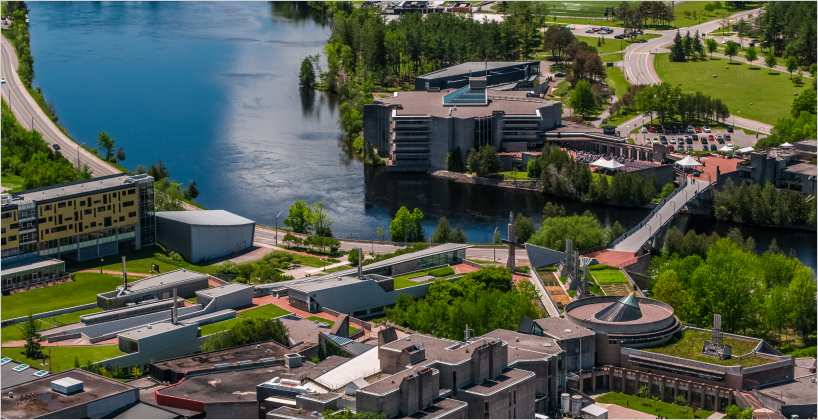University of Waterloo Engineering Overview
The University of Waterloo Faculty of Engineering offers 15 undergraduate programs: 14 professional engineering degrees (BASc), and one architecture degree (BAS).
At the heart of the University of Waterloo’s engineering education lies a commitment to fostering innovative problem-solvers. Students not only gain technical expertise but also develop critical thinking, teamwork, and communication skills. Waterloo’s co-operative education (co-op) system is renowned, allowing students to alternate between academic terms and paid work placements. This hands-on approach prepares graduates for real-world challenges. The university encourages collaboration across disciplines, providing opportunities for students to work with peers from various fields. Whether studying civil engineering or mechatronics at the University of Waterloo’s Engineering Programs, this cross-pollination of ideas fosters creativity and holistic problem-solving.
University of Waterloo Engineering Programs
- University of Waterloo Engineering Overview
- Benefits of the University of Waterloo Engineering Programs
- Architectural Engineering Program (BASc)
- Architecture Program (BAS)
- Biomedical Engineering Program (BASc)
- Chemical Engineering Program (BASc)
- Civil Engineering Program (BASc)
- Computer Engineering (BASc)
- Electrical Engineering (BASc)
- Environmental Engineering (BASc)
- Geological Engineering (BASc)
- Management Engineering (BASc)
- Mechanical Engineering (BASc)
- Mechatronics Engineering (BASc)
- Nanotechnology Engineering (BASc)
- Software Engineering (BSE)
- Systems Design Engineering (BASc)
Benefits of the University of Waterloo Engineering Programs
Waterloo’s strong ties to the tech industry, coupled with its location in Canada’s tech hub, provide ample opportunities for aspiring entrepreneurs. Students can participate in startup incubators, pitch competitions, and innovation labs. Additionally, research opportunities abound. From sustainable energy solutions to artificial intelligence, students collaborate with professors on impactful projects within the University of Waterloo’s Engineering Programs. These experiences enhance learning and open doors to advanced studies.
All prospective applicants to Waterloo engineering programs are required to submit a personal profile known as the Admission Information Form (AIF). For students whose first language is not English, meeting the University of Waterloo’s English language requirements may be necessary.
The global perspective is emphasized, with diverse student bodies and international partnerships within the University of Waterloo’s Engineering Programs. Exchange programs, study abroad opportunities, and international co-op placements allow students to broaden their horizons and appreciate different cultures. Throughout their programs, students tackle real-world design challenges, reinforcing theoretical knowledge and igniting creativity. Whether building a solar-powered vehicle, creating assistive devices, or designing sustainable infrastructure, these projects within the University of Waterloo’s Engineering Programs prepare students for the complexities of engineering.
Lastly, Waterloo’s tight-knit engineering community provides mentorship, peer support, and networking. Clubs, hackathons, and events foster camaraderie and a sense of belonging for students within the University of Waterloo’s Engineering Programs.
Architectural Engineering Program (BASc)
Architectural Engineering Admission Requirements
All Ontario students must complete six 4U, or 4M courses to be eligible for admission. Specific courses required include:
- Advanced Functions (MHF4U)
- Calculus & Vectors (MCV4U)
- Chemistry (SCH4U)
- Physics (SPH4U)
- English (ENG4U)
A minimum final grade of 70% is required in each of these courses.
Architectural Engineering Program Details
The Department of Civil and Environmental Engineering, in partnership with the Waterloo School of Architecture, offers a Bachelor of Applied Science (BASc) degree program in Architectural Engineering. This program integrates architectural design with building engineering, aiming to develop engineers capable of comprehensively understanding building design, construction, assessment, and refurbishment. The studio-based curriculum equips students with the technical knowledge and communication skills necessary for leadership roles in the building industry.
As with all Waterloo Engineering undergraduate programs, Architectural Engineering offers a direct-entry curriculum specialized from the first day. The program includes a mandatory co-op component, with all students beginning their co-op placements in the first year. This unique schedule allows students to commence hands-on learning in January of their first year, alternating between co-op work and study terms throughout their studies.
To learn more, visit: https://uwaterloo.ca/future-students/programs/architectural-engineering
Architecture Program (BAS)
Architectural Admission Requirements
Ontario students: six Grade 12 U and/or M courses including:
- English (ENG4U) (A minimum final grade of 75% is required)
- Advanced Functions (A minimum final grade of 70% is required)
- Calculus and Vectors (A minimum final grade of 70% is required)
- Physics (A minimum final grade of 70% is required)
Recommended: Grade 11 or 12 art courses, independent art studies, creative and cultural studies such as visual arts and history
Admission average: Individual selection from the mid-80s
Selected students will be invited to submit a portfolio of creative work and to complete an English précis-writing exercise as part of the application process.
Architectural Program Details
At one of North America’s leading schools of architecture, students receive a comprehensive education encompassing building materials, construction techniques, cultural history, social context, green architecture, and more, all complemented by paid co-op work experience.
The cornerstone of this pre-professional program is the design courses, beginning in the first year. Students are provided with their own dedicated space in the studio to develop ideas and skills through hands-on projects. The curriculum includes studies on society and culture, the principles of physics, construction materials and techniques, human interaction with the environment, critical thinking, and various forms of creative expression.
The School of Architecture is housed in a historic building in Cambridge, Ontario – which is approximately 30 km (a 45-minute drive) from Waterloo’s main campus. The Cambridge campus features studios, labs, exhibition galleries, and a world-class design library.
Biomedical Engineering Program (BASc)
Biomedical Engineering Admission Requirements
Ontario students: six Grade 12 U and/or M courses including:
- Advanced Functions (minimum final grade of 70% is required)
- Calculus and Vectors (minimum final grade of 70% is required)
- Chemistry (minimum final grade of 70% is required)
- Physics (minimum final grade of 70% is required)
- English (ENG4U) (minimum final grade of 70% is required)
Admission averages: Individual selection from the high 80s to low 90s
Biomedical Engineering Program Details
In Biomedical Engineering, students have the opportunity to design bionic limbs, create laser-guided surgical devices, enhance cancer-imaging systems, and develop wearable technology that improves public health and athletic performance. The program focuses on using engineering expertise to develop better methods for diagnosing illnesses, treating health issues, and enhancing overall health.
Students study biomechanics, physics, physiology, and design, which equips them with a broad knowledge base. This foundation enables collaboration with a diverse range of experts, including biologists, medical practitioners, policymakers, and engineers. The curriculum also includes learning to model and design complex biomedical systems, complemented by hands-on experience through two years of paid co-op work terms and a fourth-year design project.
Graduates of this program will be prepared to develop innovative technologies that enhance and save lives.
Chemical Engineering Program (BASc)
Chemical Engineering Admission Requirements
Ontario students: six Grade 12 U and/or M courses including:
- Advanced Functions (minimum final grade of 70% is required)
- Calculus and Vectors (minimum final grade of 70% is required)
- Chemistry (minimum final grade of 70% is required)
- Physics (minimum final grade of 70% is required)
- English (ENG4U) (minimum final grade of 70% is required)
Admission averages: Individual selection from the mid- to high 80s
Chemical Engineering Program Details
Ranked 89th globally in the QS World University Rankings 2023, the University of Waterloo Chemical Engineering program enhances students’ knowledge of physics, chemistry, biology, and math to transform raw materials into useful products. Students also learn to design and control complex physical and chemical processes.
Chemical engineers design, implement, and supervise industrial processes involving changes in matter, with applications in industries such as pharmaceuticals, energy, and plastics. They also contribute significantly to the emerging field of nanotechnology, developing eco-friendly advanced materials and devices.
Through North America’s largest co-op program, students apply their skills in various jobs that support sustainable energy, combat climate change, maximize food production, enable a circular economy, and enhance health care. The program includes six co-op terms, allowing students to build an impressive résumé, explore career options, and earn money to support their education.
Graduates are prepared for careers in renewable energy, agriculture and food processing, biotechnology and biomedical fields, pharmaceuticals, environmental remediation, and more.
Civil Engineering Program (BASc)
Civil Engineering Admission Requirements
Ontario students: six Grade 12 U and/or M courses including:
- Advanced Functions (minimum final grade of 70% is required)
- Calculus and Vectors (minimum final grade of 70% is required)
- Chemistry (minimum final grade of 70% is required)
- Physics (minimum final grade of 70% is required)
- English (ENG4U) (minimum final grade of 70% is required)
Admission averages: Individual selection from the mid- to high 80s
Civil Engineering Program Details
Civil engineers address major challenges such as population growth, climate change, and aging infrastructure to develop smart cities and a sustainable future. Civil engineers lead the creation, maintenance, and management of essential large-scale infrastructure.
Throughout six paid co-op work terms, students can explore various career options by working with major construction and engineering firms, gaining experience with local or provincial governments, or spending a term abroad.
This degree offers significant flexibility, with a wide range of electives that allow students to tailor their education to match their interests and career aspirations.
Upon graduation, students will be prepared to design, analyze, construct, and manage infrastructure projects including airports, skyscrapers, bridges, transportation networks, and municipal water systems.
Computer Engineering (BASc)
Computer Engineering Admission Requirements
Ontario students: six Grade 12 U and/or M courses including:
- Advanced Functions (minimum final grade of 70% is required)
- Calculus and Vectors (minimum final grade of 70% is required)
- Chemistry (minimum final grade of 70% is required)
- Physics (minimum final grade of 70% is required)
- English (ENG4U) (minimum final grade of 70% is required)
Previous experience in programming is recommended.
Admission averages: Individual selection from the high 80s to low 90s
Computer Engineering Program Details
As experts in computer hardware-software interactions, students studying Computer Engineering at Waterloo will be prepared for careers working with cutting-edge technologies.
Through labs and lectures, students gain experience with all aspects of computers, from chips and wiring to software, networks, and communications. They will learn the fundamentals of computer engineering in one of the top 75 programs globally (Academic Rankings of World Universities 2023). Additionally, co-op terms provide two years of paid work experience.
Graduates will be ready for careers as software developers, hardware engineers, IT specialists, systems designers, and more, across industries such as enterprise software, automotive, aerospace, automation and robotics, networks and databases, healthcare, and security
Electrical Engineering (BASc)
Electrical Engineering Admission Requirements
Ontario students: six Grade 12 U and/or M courses including:
- Advanced Functions (minimum final grade of 70% is required)
- Calculus and Vectors (minimum final grade of 70% is required)
- Physics (minimum final grade of 70% is required)
- Chemistry (minimum final grade of 70% is required)
- English (ENG4U) (minimum final grade of 70% is required)
Admission averages: Individual selection from the high 80s to low 90s
Previous experience in programming is recommended.
Electrical Engineering Program Details
In the University of Waterloo Electrical Engineering program, students learn to harness the power of electricity to innovate in electronics, sensors, and information networks. Their degree from Waterloo, ranked 18th globally for electrical engineering (Academic Rankings of World Universities 2023), provides a strong foundation for their careers.
Students delve into the fundamentals of electromagnetism, circuits, algorithms, and instrumentation, with opportunities to specialize in areas such as power generation and clean energy, electric vehicles, Internet of Things, quantum computing, integrated circuit design, and machine learning.
Beginning in the first year, students gain hands-on experience through paid co-op work terms and access to top-notch student labs in North America.
Upon graduation, students will find numerous career paths available to them, ranging from designing power stations and aircraft control systems to shaping the future of microprocessors and telecommunications systems.
Environmental Engineering (BASc)
Environmental Engineering Admission Requirements
Ontario students: six Grade 12 U and/or M courses including:
- Advanced Functions (minimum final grade of 70% is required)
- Calculus and Vectors (minimum final grade of 70% is required)
- Physics (minimum final grade of 70% is required)
- Chemistry (minimum final grade of 70% is required)
- English (ENG4U) (minimum final grade of 70% is required)
Admission averages: Individual selection from the mid- to high 80s
Environmental Engineering Program Details
As an Environmental Engineering student at the University of Waterloo, students play a vital role in addressing critical environmental challenges affecting natural and built structures. They develop skills to design efficient water treatment and distribution systems, remediate contaminated soil, and prevent outbreaks like E. coli. As climate change and resource scarcity accelerate, there is an urgent need for solutions that protect our planet.
At Waterloo, students can cultivate their interests in sustainability, mathematics, and science. Through six co-op work terms, spanning two years, they gain valuable paid experience, enabling them to explore various career paths and earn income.
Upon graduation, students are equipped to tackle pollution and drive innovation in smart environmental design across different sectors.
Geological Engineering (BASc)
Geological Engineering Admission Requirements
Ontario students: six Grade 12 U and/or M courses including:
- Advanced Functions (minimum final grade of 70% is required)
- Calculus and Vectors (minimum final grade of 70% is required)
- Chemistry (minimum final grade of 70% is required)
- Physics (minimum final grade of 70% is required)
- English (ENG4U) (minimum final grade of 70% is required)
Admission averages: Individual selection from the mid- to high 80s
Geological Engineering Program Details
Students in the Geological Engineering program at the University of Waterloo utilize the physical mechanics of the earth’s surface to address complex challenges. They ensure the safety of infrastructure like dams and pipelines, assess risks associated with landslides and earthquakes, and address groundwater contamination, among other tasks.
Waterloo’s program, one of only two in Ontario, blends Civil Engineering courses for design and problem-solving skills with Earth Sciences courses for a solid background in geosciences. Through co-op, students gain two years of relevant work experience.
Field courses provide hands-on experience in examining geological processes, offering an alternative to desk-based work.
Upon graduation, students are equipped for diverse career opportunities worldwide, including natural resource and mineral exploration, groundwater protection and management, geohazard prevention and mitigation, and infrastructure planning.
Management Engineering (BASc)
Management Engineering Admission Requirements
Ontario students: six Grade 12 U and/or M courses including:
- Advanced Functions (minimum final grade of 70% is required)
- Calculus and Vectors (minimum final grade of 70% is required)
- Chemistry (minimum final grade of 70% is required)
- Physics (minimum final grade of 70% is required)
- English (ENG4U) (minimum final grade of 70% is required)
Admission averages: Individual selection from the high 80s
Management Engineering Program Details
At the University of Waterloo’s Management Engineering program, students learn to analyze organizational operations and decision-making processes, applying engineering principles to enhance efficiency. Throughout the degree, students specialize in areas such as data analytics, information systems, operations and supply chain management, and organizational behavior. Co-op opportunities provide practical experience.
Upon graduation, students have the skills to design and manage complex systems. A wide range of companies seek these skills, including those in software development, finance, supply chain management, healthcare, manufacturing, and other sectors.
Mechanical Engineering (BASc)
Mechanical Engineering Admission Requirements
- Advanced Functions (minimum final grade of 70% is required)
- Calculus and Vectors (minimum final grade of 70% is required)
- Chemistry (minimum final grade of 70% is required)
- Physics (minimum final grade of 70% is required)
- English (ENG4U) (minimum final grade of 70% is required)
Admission averages: Individual selection from the high 80s to low 90s
Mechanical Engineering Program Details
If you have a passion for innovation in motion, this program is tailored for you. At Waterloo, students develop the skills necessary to design a spectrum of products, from switches to spacecraft.
The curriculum provides a comprehensive foundation in mechanical design, covering mechanics, power, control, and manufacturing. Additionally, students learn to lead diverse teams, solve intricate problems, generate impactful innovations, and apply these skills in real-world settings through co-op experiences.
Mechanical engineers have the flexibility to work across various industries, striving to enhance machinery in terms of speed, weight, cleanliness, and reliability.
With two years of career-relevant experience gained through co-op placements, graduates possess a compelling edge on their resumes, undoubtedly impressing prospective employers.
Mechatronics Engineering (BASc)
Mechatronics Engineering Admission Requirements
Ontario students: six Grade 12 U and/or M courses including:
- Advanced Functions (minimum final grade of 70% is required)
- Calculus and Vectors (minimum final grade of 70% is required)
- Chemistry (minimum final grade of 70% is required)
- English (ENG4U) (minimum final grade of 70% is required)
- Physics (minimum final grade of 70% is required)
Admission average: Individual selection from the high 80s to low 90s
Mechatronics Engineering Program Details
In Canada’s first program of its kind, students develop expertise in mechanical engineering, control engineering, electronics, and computer science, merging knowledge from these distinct fields to create sophisticated machines. Autonomous vehicles, drones, 3D printers, smartphones, satellite systems, and robotics—all represent the computer-controlled electromechanical systems that students will learn to design.
During co-op terms, students have the opportunity to explore different career paths, earn money to finance their education, and build a résumé guaranteed to impress potential employers.
Nanotechnology Engineering (BASc)
Nanotechnology Engineering Admission Requirements
Ontario students: six Grade 12 U and/or M courses including:
- Advanced Functions (minimum final grade of 70% is required)
- Calculus and Vectors (minimum final grade of 70% is required)
- Chemistry (minimum final grade of 70% is required)
- Physics (minimum final grade of 70% is required)
- English (ENG4U) (minimum final grade of 70% is required)
Admission averages: Individual selection from the mid- to high 80s
Nanotechnology Engineering Program Details
Nanotechnology Engineering represents a pivotal aspect of future technology, impacting diverse spheres such as healthcare, climate resilience, national security, computational innovation, and economic growth. It has contributed significantly to vital areas such as the development of COVID mRNA vaccines, biomedical advancements, and advanced electronic components. Additionally, nanotechnology plays a crucial role in fostering sustainable practices and addressing climate challenges through the advancement of renewable energy technologies.
This program holds the distinction of being the first accredited nanotechnology program in Canada, providing students access to a specialized clean room equipped with cutting-edge equipment tailored for their needs. Through interdisciplinary studies spanning biology, chemistry, electronics, and quantum physics, students delve into the creation of materials and devices at the nanoscale.
Hands-on laboratory experiences and opportunities for paid co-op placements augment the academic journey. Graduates are poised to capitalize on the substantial investments anticipated in the global nanotechnology sector, driving advancements in computing, healthcare, and renewable energy solutions.
Software Engineering (BSE)
Software Engineering Admission Requirements
Ontario students: six Grade 12 U and/or M courses including:
- Advanced Functions (minimum final grade of 70% is required)
- Calculus and Vectors (minimum final grade of 70% is required)
- Chemistry (minimum final grade of 70% is required)
- Physics (minimum final grade of 70% is required)
- English (ENG4U) (minimum final grade of 70% is required)
Experience in developing well-structured, modular programs is required.
Grade 11 U Introduction to Computer Science and Grade 12 U Computer Science are recommended as helpful background for the program.
Admission averages: Individual selection from the low to mid-90s
Software Engineering Program Details
In the University of Waterloo Software Engineering program, students engage in more than just coding. They delve into software architecture analysis, algorithm application, comprehension of digital hardware systems, and the design of human-computer interfaces. Moreover, students acquire teamwork and project management skills within the framework of one of the world’s top universities for software engineering (ranked 19th globally for research performance, EduRank 2023).
During co-op terms, students apply these acquired skills at reputable companies or emerging startups. Upon graduation, students are equipped to develop dependable, cost-effective, and high-speed software solutions for a myriad of applications.
Systems Design Engineering (BASc)
Systems Design Engineering Admission Requirements
Ontario students: six Grade 12 U and/or M courses including:
- Advanced Functions (minimum final grade of 70% is required)
- Calculus and Vectors (minimum final grade of 70% is required)
- Chemistry (minimum final grade of 70% is required)
- Physics (minimum final grade of 70% is required)
- English (ENG4U) (minimum final grade of 70% is required)
Admission averages: Individual selection from the high 80s to low 90s.
Systems Design Engineering Program Details
The interactions among various elements on our planet, such as transportation networks, energy transfer, and biological systems, are complex and interconnected. Systems Design Engineering takes a holistic approach to understand these connections, driving technological advancements and innovation. Students learn the fundamentals of electrical, mechanical, and software engineering to equip themselves for careers with the versatility to address global challenges.
This program emphasizes the examination of multiple factors involved in engineering problems, including people, materials, tools, and software. Students develop skills to analyze systems comprehensively, considering how changes in one aspect affect others, utilizing various modeling, analysis, and design techniques. With a choice of 300 electives, students gain a well-rounded educational experience.
The project-based learning approach offers ample opportunities to apply knowledge to real-world problems across diverse industries. Additionally, students benefit from two full years of paid work experience through North America’s largest co-op program.
Upon graduation, students are prepared to design innovative solutions for complex engineering challenges, ranging from healthcare management to advanced cyber-physical security and intricate energy systems.






